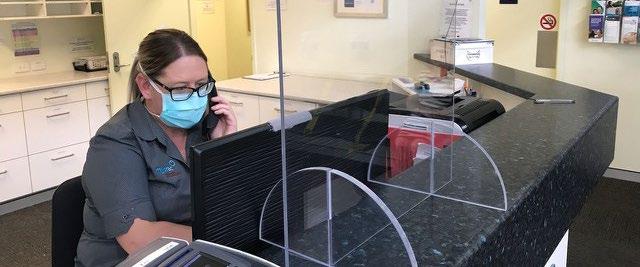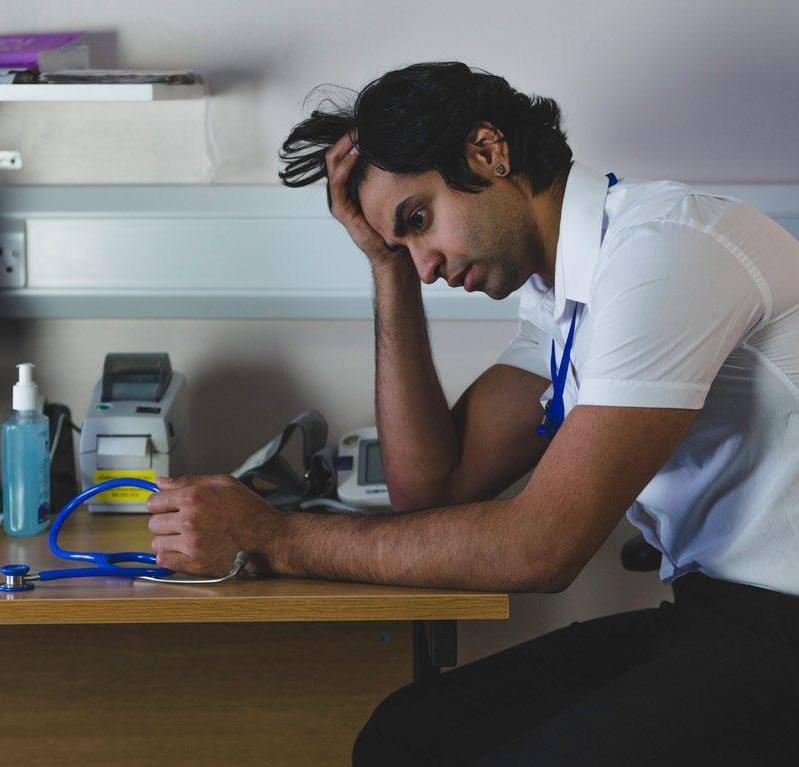
7 minute read
Follow up systems and recalls
Follow-up appointments, sometimes referred to as recalls, are important for both the patient and general practice. Clinically significant results must be communicated quickly and appropriately so appropriate action can be taken, reducing the likelihood of adverse patient outcomes that may lead to medico-legal issues for the practice.
In 2012, 'recalls' became the focus of a Victorian Supreme Court case (Grinham v Tabro Meats Pty Ltd and Victorian WorkCover Authority v Murray) which examined the ‘clinical and legal obligations of a doctor in relation to the follow up of a patient when they do not return for further testing or consultation despite being asked to do so’. As a result of legal proceedings from this case, it was established that a general practitioner can potentially defend an allegation of a failure to recall a patient so long as there is sufficient evidence that reasonable attempts were made to recall and contact the patient. Follow-up and recall systems are outlined in the RACGP Standards 5th edition under GP Standard 2, Comprehensive care, which ensures practices provide comprehensive care to patients. Criterion GP2.2 has four mandatory indicators and one aspirational indicator.
Key definitions
As defined within the RACGP Standards for general practices 5th edition glossary of terms Clinical significance High-risk results A way of referring to an assessment of: Clinical test results that are seriously abnormal and • the probability that a patient will be harmed life-threatening and need to be communicated in if they do not receive further medical advice, an appropriately timely manner. treatment or other diagnostics Recall • the likely seriousness of the harm. The process of requesting a patient to attend a consultation to receive further medical advice on Follow up matters of clinical significance. Activities that are the logical and responsible steps to take after taking earlier related actions, Reminder including: A reminder occurs due to the patient being added • making a phone call to find out the status of tests and results that are expected but not yet been received, and to a recommended preventive activity list that is generated and actioned periodically. For example, cervical screen or immunisation in a reminder list. • contacting a patient to discuss a report, test or results.
Criterion GP2.2 – Follow-up systems
The RACGP Standards 5th edition notes that 'the information gained from tests can affect the choices that a patient, the GP, and other clinicians make about the patient’s care. Clinically significant results need to be communicated quickly and appropriately so appropriate action can be taken, which can reduce the likelihood of an adverse patient outcome. It is best practice to inform patients of clinically significant results face-to-face, so the patient can ask questions and receive advice from the GP. Using recalls and reminders to proactively contact patients about their care means that patients will be more likely to, for example, come back to the practice to discuss a test result or undergo a preventive activity, such as cancer screening. Failure to recall a patient may result in an adverse outcome and the responsible practitioner may face medico-legal action.'
GP2.2 A
GP2.2 A Pathology results, imaging reports, investigation reports, and clinical correspondence that our practice receives are reviewed; electronically notated, or, if on paper, signed or initialled; acted on where required; and incorporated into the patient health record. To meet GP2.2 A, your practice must record details of a GP’s review of pathology results in the patient’s health record and have a process to review and manage results received by the practice. To ensure this process is met, your practice could have a policy and/or documented procedures for reviewing and managing results.
GP2.2 B
GP2.2 B Our practice recalls patients who have clinically significant results. Your practice must document in the patient’s health record each attempt to contact and recall patients about clinically significant results and have a process for recalling patients with clinically significant results. Meeting this indicator could be done by having a recall policy that outlines recall responsibilities in relevant position descriptions, with a specific team member holding lead responsibility. This indicator is one that benefits greatly from the practice having a clinical information software system, often referred to as ‘medical software’.
In the past few years, medical software providers have created a range of options to assist in the recall process. Many practices find these recall processes are quicker and more efficient than ever before – ensuring this key activity is well managed and giving practice staff more time to spend on other tasks. This system could assist in maintaining templates to trigger and send recalls.
Using medical software for recalls
Follow the links below to see more about using recalls in your practices’ software: Best Practice – Recall appointments https://bit.ly/QN20_recallBP Clinic to Cloud – Patient recall https://bit.ly/QN20_recallC2C Genie Solutions – Recalls https://bit.ly/QN20_recallGS HealthEngine – Recalls Help Centre https://bit.ly/QN20_recallHE Helix – User Guide: Recalls https://bit.ly/QN20_recallHx HotDoc – Recalls (integrated with Medical Director, Best Practice and ZedMed) https://bit.ly/QN20_recallHD Medical Director – Clinical: Recalls https://bit.ly/QN20_recallMD Practice Hub –Using Recalls https://bit.ly/QN20_recallPH
GP2.2 C
Indicator GP2.2 C Our patients are advised of the practice’s process for follow-up tests and results.
This means that the practice must document in the patient’s health record what follow-up has occurred and what treatment, if any, was required and document conversations about test results in the patient’s notes. The practice team members must also be educated on this process so patients are aware of and told of the process to receive results. This indicator echoes the ‘could’ items of GP2.2 B with the recall policy and procedure, responsibilities of the team for the recall process and utilising the medical software system for recalls.
GP2.2D
GP2.2D Our practice initiates and manages patient reminders.
While not mandatory, GP2.2D offers opportunities where your practice 'could' implement a range of options for patient reminders that support the A, B, C and E mandatory indicators. Take a look at page 130 of the Standards to see the range of options in how to initiate and manage reminders.
GP2.2 E
GP2.2 E High-risk (seriously abnormal and lifethreatening) results identified outside normal opening hours are managed by our practice. At times, general practices will receive high-risk results outside of normal practice areas depending on the severity of the results and issues. This indicator requires high-risk results identified outside normal opening hours to be managed by the practice. Within Indicator GP2.2 E, your practice must give diagnostic services the contact details of the practitioner who ordered the investigation and have a process for managing high-risk results identified outside of normal opening hours. To achieve compliance in this Indicator, your practice could have a dedicated team member who receives high-risk results outside of normal opening hours. Your practice should ensure all practice team members are educated about how anyone who provides diagnostic services or receives high-risk results outside of normal opening hours can contact the practice team member/s who have access to the patient’s health record.
Where a designated contact is appointed, it is important that your practice ensures their current contact details are provided.
The key is in your practice’s policy and procedure manual
A well-rounded policy and procedure manual will assist your practice in meeting elements of mandatory Indicators GP2.2 A, B, C and E, and aspirational Indicator GP2.2 D. If your practice has utilised the AGPAL Policy and Procedure Manual Template resource, available within your AGPAL accreditation hub, your practice is likely already compliant with these indicators. Specifically, section ‘7.7 Follow up of tests, results and referrals’ of AGPAL’s Policy and Procedure Manual Template outlines the following key items for review by your practice: Sometimes our general practitioners may need to be contacted outside our practice’s normal opening hours by the pathology service about a serious or life-threatening result, and we have provisions for allowing this contact to occur (refer to Section 5.10 – After-hours service). Our patients (or their carers) are made aware of their obligations and responsibilities for their own healthcare. This includes being informed about how to obtain their results and the seriousness of not attending for ordered appointments/investigations and any recall or subsequent follow-up. Where appropriate, this advice is documented in the patient’s health record. Where a patient indicates they do not intend to comply with a recommended test or referral, the patient is deemed to have refused medical treatment or advice and is managed in accordance with 'Section 7.12 – Management of a patient refusing treatment or advice'. In addition to an appreciation of the need for timeliness when following up and actioning referrals, tests and results, our practice team members are aware of the need for confidentiality and discretion with regard to referrals, diagnostic tests and results or correspondence.
Resources
There is a suite of resources available to support you and your team in meeting Criterion GP2.2. Take a look at the webinars, and use the templates to get you on your way: AGPAL accreditation hub • Policy and Procedure Manual Template (Section 5.2 Appointments and Section 7.7 - Follow up of tests, results and referrals), and • Recall letter template. RACGP Guide to providing telephone and video consultations in general practice – specifically Section 2. Providing and documenting care http://bit.ly/QN20_recall2.1 RACGP eHealth - Guiding principles for clinical follow up systems in medical software (for 4th edition Standards) http://bit.ly/QN20_Recall1
RACGP webinar: Improving health record quality in general practice (27 June 2019) https://bit.ly/QN20_recall3
RACGP webinar: Technology in general practice (25 July 2019) https://bit.ly/QN20_recall4







